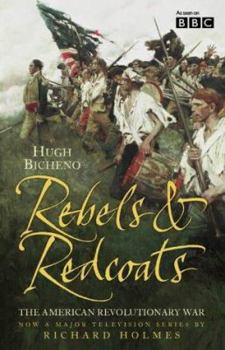Rebels and Redcoats
Select Format
Select Condition 
Book Overview
Controversial and revisionist history of America's first civil war. Published with hugely successful accompanying four-part BBC TV series - written and presented by star military historian, Richard... This description may be from another edition of this product.
Format:Hardcover
Language:English
ISBN:0007156251
ISBN13:9780007156252
Release Date:January 2003
Publisher:HarperColinsPublishers
Length:352 Pages
Weight:1.60 lbs.
Dimensions:9.4" x 1.4" x 6.3"
Customer Reviews
3 ratings
Deliciously vicious--or consistently mean-spirited?
Published by Thriftbooks.com User , 18 years ago
I recently read David McCollough's popular "1776" and Don Cook's less popular, but more thorough, "The Long Fuse: How England Lost the American Colonies, 1760-1785." They both left me with the question, "What were the British thinking?" I.e., what did the British decision-makers believe, know, intend, plan, and expect? Via a British friend, I got a recommendation from a university Reader in American History (Associate Professor) for this book as "the best general history ... of a far higher standard than McCullough, but still lively and accessible to a general audience." "Rebels & Redcoats" was certainly eye-opening in some respects, including its view of the Founding Fathers as a reprehensible bunch who dragged their mostly-unwilling countrymen into an unnecessary war. It is incessant in its attacks on "the Foundation Myth" (on which I was raised). Depending on taste, this is either the most deliciously vicious, or the most consistently mean-spirited, book of historical non-fiction that I can recall. The only major figure (American or British) to emerge relatively unscathed is Benedict Arnold--possibly because his reputation has already been ruined. On topics where Bicheno agrees with the conventional view, he says little or nothing, and he presents little concrete evidence for many of his most sweeping character judgments. To my mind, much of the book reeks of what I call "Simon Schama-ism": The use of a book ostensibly directed to the general reader to attack other historians' positions, without the encumbering impedimenta of scholarly publication. Bicheno often assumes that the reader already knows the history he is commenting on, rather than troubling to present it himself. Had I not already read the other books, I would have been mystified by a number of Bicheno's discursions, and would have lacked the background to connect many of the book's parts to its whole. Three allegations in the book have the potential to significantly alter my view of important aspects of the Revolution: 1) The supply of arms and military stores cached in Concord in April 1775 included three 24-pounder cannon. "These were 5600-pound monsters requiring eight to ten men to serve them and a team of six horses to pull them... They were siege guns, not field artillery pieces, and how they came to be buried in the courtyard of the Concord jail is a mystery... The conspirators were desperate to provoke some bloody event to polarize opinion, and the French would have regarded a brace and a half of 24-pounders as seed corn... The existence of such powerful weapons at such a place and time of itself is one of those ugly facts so harmful to beautiful theories, in this case the myth of peace-loving farmers spontaneously rising up against unprovoked aggression." 2) "Myth has it these were either personal weapons or stocks siezed from poorly guarded depots, but even if we are to suppose that every colony gave up every weapon it captured in 1775-76, more cannon were lost
Good, unbiased account.
Published by Thriftbooks.com User , 18 years ago
I was quite unaware that the British Army defeated the US Army in about 80% of the battles fought. The only oustanding US victory against British forces during the whole period was at Cowpens. Hardly an honourable win seeing as the British soldiers involved were ravaged with hunger and fatigue and were out numbered. French involvment from the outset resulted in the British withdrawing after Yorktown. A good, if a little complicated read. Infact, it only underlines why Americans flag wave so much... it is a way of hiding the true nature of the Revolution and the dis-honourable blunders and defeats that came with it.
The truth about the American War for a change...
Published by Thriftbooks.com User , 19 years ago
This book is a fascinating and detailed overview of the American War that is unbiased, accurate and honest for a change. It just tells us what happened, when and where. The British won most of the battles in this conflict and captured most of the biggest settlements. The American Rebels spent most of the war on the defensive, usually retreating instead of risking pitched battles where possible. The French came in and saved the Americans by giving them money and military aid! Other myths that are exploded include the idea, still popular today in America, that the Rebels won the Battle of Bunker Hill in 1775. In fact, as this book convincingly demonstrates, the British actually won the battle! If you wish to know what really happened in this eight and a half year war, reading this book is well worth your time. It really does put it straight and is superior to fanciful, Brit-bashing films like Mel Gibson's 'The Patriot'. Anyway, buy and read at all costs...






